After Suelyn Farel got an email alert that someone had downloaded her entire customer database, she learned that two former employees had conspired to steal from her beauty products company.
Farel had allowed the staffers to keep working after they each gave notice in late 2017; when they left the New York-based Julien Farel Group, their passwords for its system were still active. The theft led the company's database provider to block Farel's access for four months while the incident was being investigated, costing the firm an estimated $70,000 to $80,000 in business. Farel felt betrayed.
"It was a huge eye opener. I'm someone who's very trusting and I love our employees," she says. "It really reminded me that I have to be careful, that possibly my judgment of the character of people around me is wrong."

In this Wednesday, March 13, 2019 photo, Deb and Kevin Durken pose for a photo in their boot store The Boot Shack in St. Cloud, Minn. The bookkeeper for the Durken's store forged checks and stole an estimated $225,000 over 10 years, Deb says. The bookkeeper was able to keep stealing because she was trusted to do her work unsupervised. (AP PhotoJim Mone)
Employees may steal from companies of any size, but small and mid-sized businesses can be more vulnerable because they lack practices and systems designed to prevent wrongdoing. Their technology may not be as secure as at a larger company, and they may not have the staffing to provide the kind of checks and balances that make it harder to steal. The more familiar atmosphere at some companies may make it easier for employees to plan and conceal a crime and keep on committing it.
Farel has since changed her policies. The day staffers give notice is usually their last and they lose their access to company email and the rest of the computer system. She keeps a list of everyone's passwords and makes sure they are disabled.
Farel has taken steps that should be standard operating procedure at all companies, says Shira Forman, an employment attorney with Sheppard Mullin in New York. If a current staffer is suspected of stealing, bosses should still "cut off access and stop the bleeding," Forman says.

In this Wednesday, March 13, 2019 photo, with Deb Durken in the background, Kevin Durken poses for a photo in their boot store The Boot Shack in St. Cloud, Minn. The bookkeeper for the Durken's store forged checks and stole an estimated $225,000 over 10 years, Deb says. The bookkeeper was able to keep stealing because she was trusted to do her work unsupervised. (AP PhotoJim Mone)
"One approach might be to put the employee on leave while you investigate, and have any kind of data access frozen while you do that," she says.
It's a good idea, whether an owner suspects or knows for sure that a staffer has stolen, to get legal advice on how to proceed, Forman says.
In the case of a theft via computer, owners need an electronic paper trail. The initial email from Farel's database provider said the download was made from an internet service provider in Brooklyn, so Farel knew the theft didn't take place at her office. She was also able to find out that the download occurred at the new employer of one of the ex-staffers. Farel reported the theft to the district attorney's office; the case has not yet been resolved.
There aren't definitive statistics showing how many companies have experienced employee theft because many cases go unreported. Owners may feel embarrassment and shame, and don't want to bring negative attention to their companies. But insurer Hiscox, which analyzed nearly 400 employee theft cases in federal courts in 2016, said 68 percent occurred at companies with fewer than 500 employees. Those companies lost a median $289,864.
Misplaced trust can be a problem for business owners who find it hard to imagine that a staffer, especially one who's been with the company for years, would steal, says Doug Karpp, a senior vice president with Hiscox.
"When you have five or 10 people in an office, you trust each other like family members," he says. Owners may feel so secure that they focus too little on what staffers are doing — allowing thefts to continue over an extended time, Karpp says.
The bookkeeper for Deb and Kevin Durken's store, The Boot Shack, forged checks and stole an estimated $225,000 over 10 years starting in 1999, Deb Durken says. The bookkeeper was able to keep stealing because she was trusted to do her work unsupervised. Deb Durken wasn't working at the St. Cloud, Minnesota, store during that time, but she noticed discrepancies when she checked invoices and bank statements. However, the couple disagreed about what to do, and they didn't investigate further. It wasn't until 2009 that the bank called, questioning a check that had no payee.
Deb Durken, a paralegal, played detective and figured out that the bookkeeper had written a series of checks without payees and then altered copies of checks in bank statements to look like they had vendors' names.
"I dreaded telling Kevin when he came home," Deb Durken says. "He was literally sick, felt betrayed."
The Durkens pressed charges and their former bookkeeper has made partial restitution. The couple has insurance against employee theft that has given them about $50,000. And the situation won't happen again, Deb Durken says. She's now handling the company's books.
Two employees have stolen from Leslie Saul's Cambridge, Massachusetts, architectural firm over a 30-year span. One was an intern who bought merchandise and used a car service, paying with company accounts; his parents made restitution for the $3,000 to $5,000 he stole. The second was a designer who downloaded images and client information and used them without permission to help launch a new firm. Saul doesn't believe her firm suffered any financial losses in that case.
Saul wonders if she needs to be more careful in hiring to ensure this doesn't happen again — although she has hired dozens of staffers who didn't steal. But she keeps in mind something a mentor told her years ago:
"'You can always teach skills but you can't teach who the person is — look for the person first and then the skills,'" Saul says. "I do think that's the greatest advice."
For more small business news, insights and inspiration, sign up for our free weekly newsletter here: http://discover.ap.org/ssb
Follow Joyce Rosenberg at www.twitter.com/JoyceMRosenberg . Her work can be found here: https://apnews.com
VENICE, Italy (AP) — Under the gaze of the world’s media, the fragile lagoon city of Venice launches a pilot program Thursday to charge day-trippers a 5-euro (around $5.35) entry fee that authorities hope will discourage visitors from arriving on peak days and make the city more livable for its dwindling residents.
Signs advising arriving visitors of the new requirement for a test phase of 29 days through July have been erected outside the main train station and other points of arrival.
Some 200 stewards have been trained to politely walk anyone unaware of the fee through the process of downloading a QR code. A kiosk has been set up for those not equipped with a smartphone. Once past designated entry ports, officials will carry out random checks for QR codes that show the day-tripper tax has been paid or that the bearer is exempt.
Transgressors face fines 50 euros to 300 euros. The requirement applies only for people arriving between 8:30 a.m. and 4 p.m. Outside of those hours, access is free.
“We need to find a new balance between the tourists and residents,’’ said the city’s top tourism official, Simone Venturini. “We need to safeguard the spaces of the residents, of course, and we need to discourage the arrival of day-trippers on some particular days.”
Venice has long suffered under the pressure of over-tourism, but officials say that pre-pandemic estimates ranging from 25 million to 30 million visitors a year — including day-trippers — are not reliable and that the pilot project also aims to come up with more exact figures to help better manage the phenomenon.
By contrast, registered visitors spending the night last year numbered 4.6 million, according to city figures, down 16% from pre-pandemic highs.
Venturini said the city is strained when the number of day-trippers reaches 30,000 to 40,000. Its narrow alleyways are clogged with people and water taxis packed, making it difficult for residents to go about their business.
Not all residents, however, are persuaded of the efficacy of the new system in dissuading mass tourism, and say more attention needs to be paid to boosting the resident population and services they need.
Venice last year passed a telling milestone when the number of tourist beds exceeded for the first time the number of official residents, which is now below 50,000 in the historic center with its picturesque canals.
“Putting a ticket to enter a city will not decrease not even by one single unit the number of visitors that are coming,’’ said Tommaso Cacciari, an activist who organized a protest Thursday against the measure.
“You pay a ticket to take the metro, to go to a museum, an amusement park; you don’t pay a ticket to enter a city. This is the last symbolic step of a project of an idea of this municipal administration to kick residents out of Venice,” he said.
Venturini said about 6,000 people had already paid to download the QR code, and officials expect paid day-tripper arrivals Thursday to reach some 10,000.
More than 70,000 others have downloaded a QR code denoting an exemption, including to work in Venice or as a resident of the Veneto region. People staying in hotels in Venice, including in mainland districts like Marghera or Mestre, should also get a QR code attesting to their stay, which includes a hotel tax.
The tourist official says interest in Venice's pilot program has been keen from other places suffering from mass tourism, including other Italian art cities and cities abroad such as Barcelona and Amsterdam.
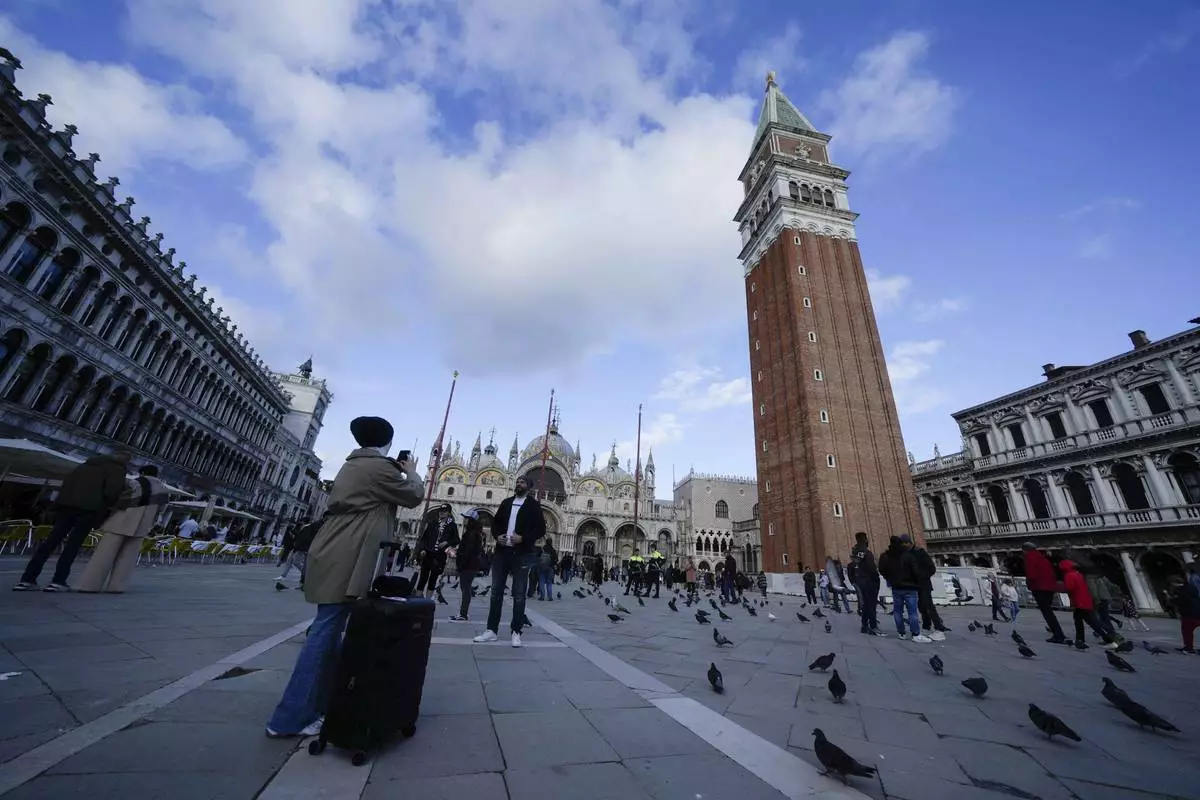
Tourists take pictures at the St. Mark square in Venice, Italy, Wednesday, April 24, 2024. The lagoon city of Venice begins a pilot program Thursday, April 25, 2024 to charge daytrippers a 5 euro entry fee that authorities hope will discourage tourists from arriving on peak days. Officials expect some 10,000 people will pay the fee to access the city on the first day, downloading a QR code to prove their payment. (AP Photo/Luca Bruno)
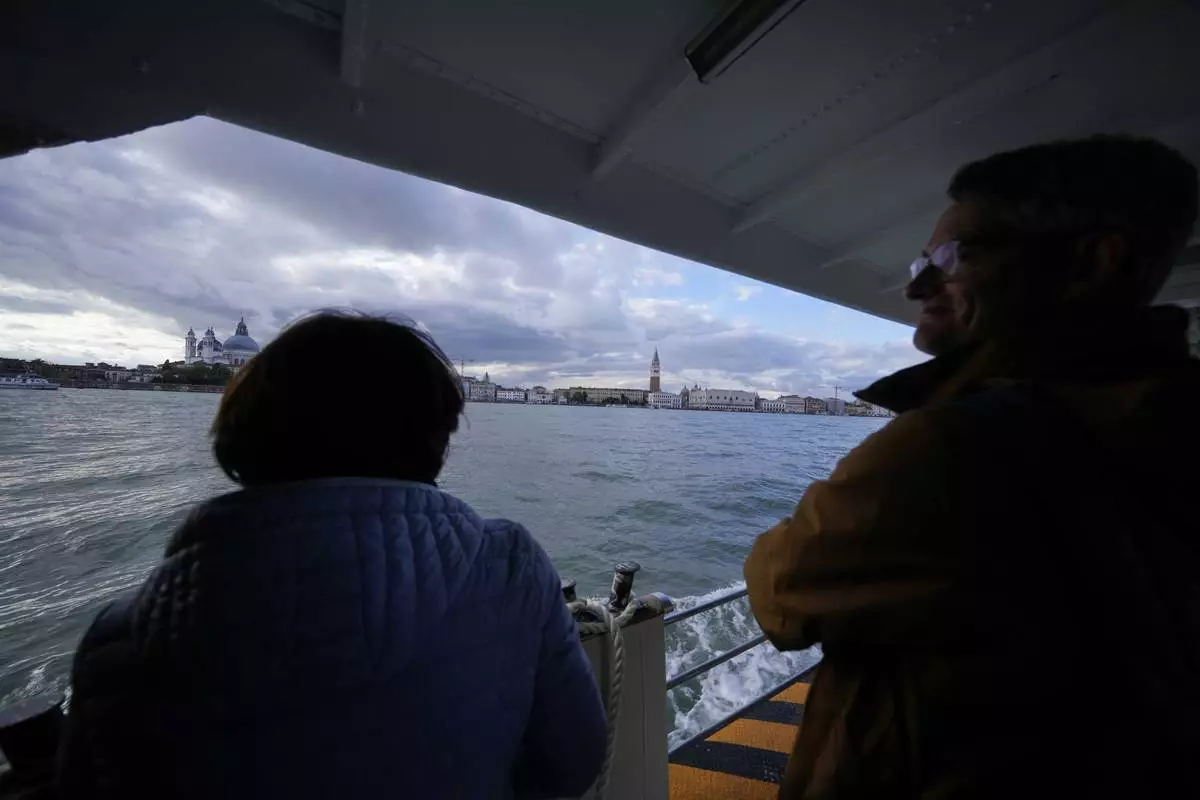
Tourists ride on a ferry boat in Venice, Italy, Wednesday, April 24, 2024. The lagoon city of Venice begins a pilot program Thursday, April 25, 2024 to charge daytrippers a 5 euro entry fee that authorities hope will discourage tourists from arriving on peak days. Officials expect some 10,000 people will pay the fee to access the city on the first day, downloading a QR code to prove their payment. (AP Photo/Luca Bruno)
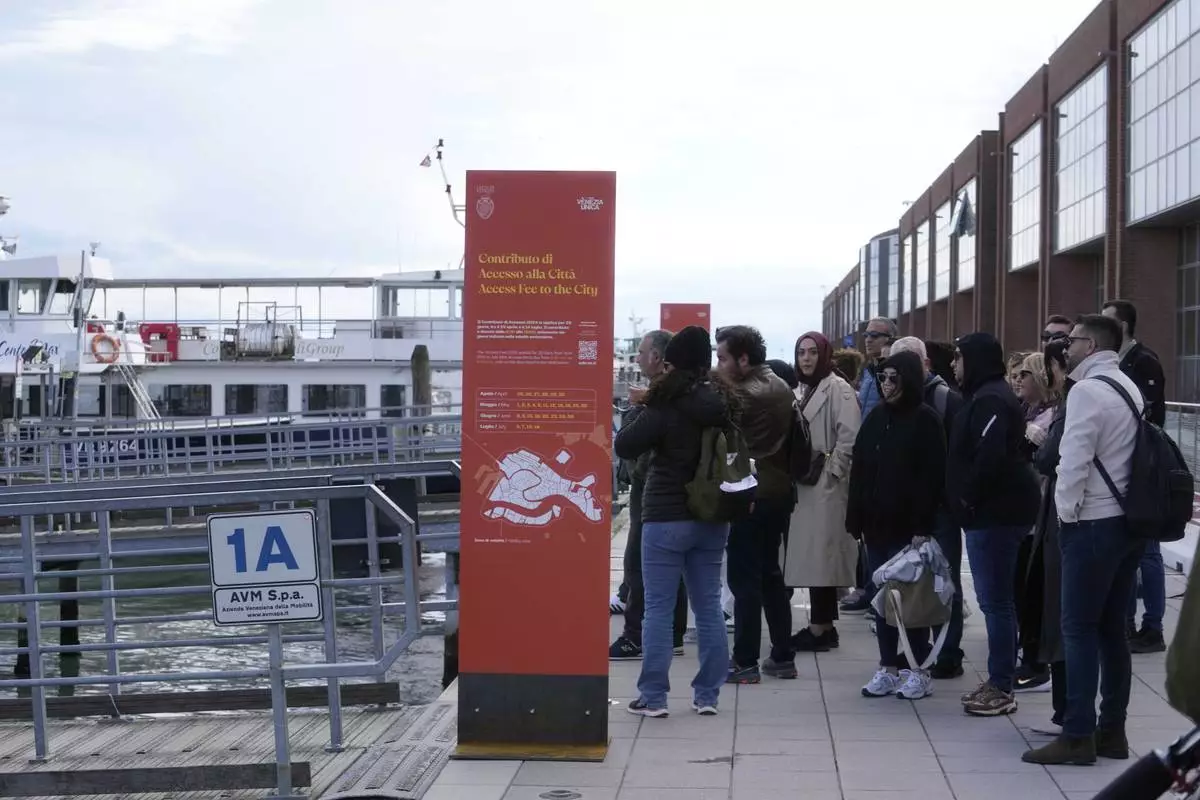
People stand in front of an information board explaining how to pay the tourist tax in Venice, Italy, Wednesday, April 24, 2024. The lagoon city of Venice begins a pilot program Thursday, April 25, 2024 to charge daytrippers a 5 euro entry fee that authorities hope will discourage tourists from arriving on peak days. Officials expect some 10,000 people will pay the fee to access the city on the first day, downloading a QR code to prove their payment. (AP Photo/Luca Bruno)

Marco Bettini, director of Venis Informatics System, gestures as he talks to reporters at the police Venice control room, in Venice, Italy, Wednesday, April 24, 2024. The lagoon city of Venice begins a pilot program Thursday, April 25, 2024 to charge daytrippers a 5 euro entry fee that authorities hope will discourage tourists from arriving on peak days. Officials expect some 10,000 people will pay the fee to access the city on the first day, downloading a QR code to prove their payment. (AP Photo/Luca Bruno)
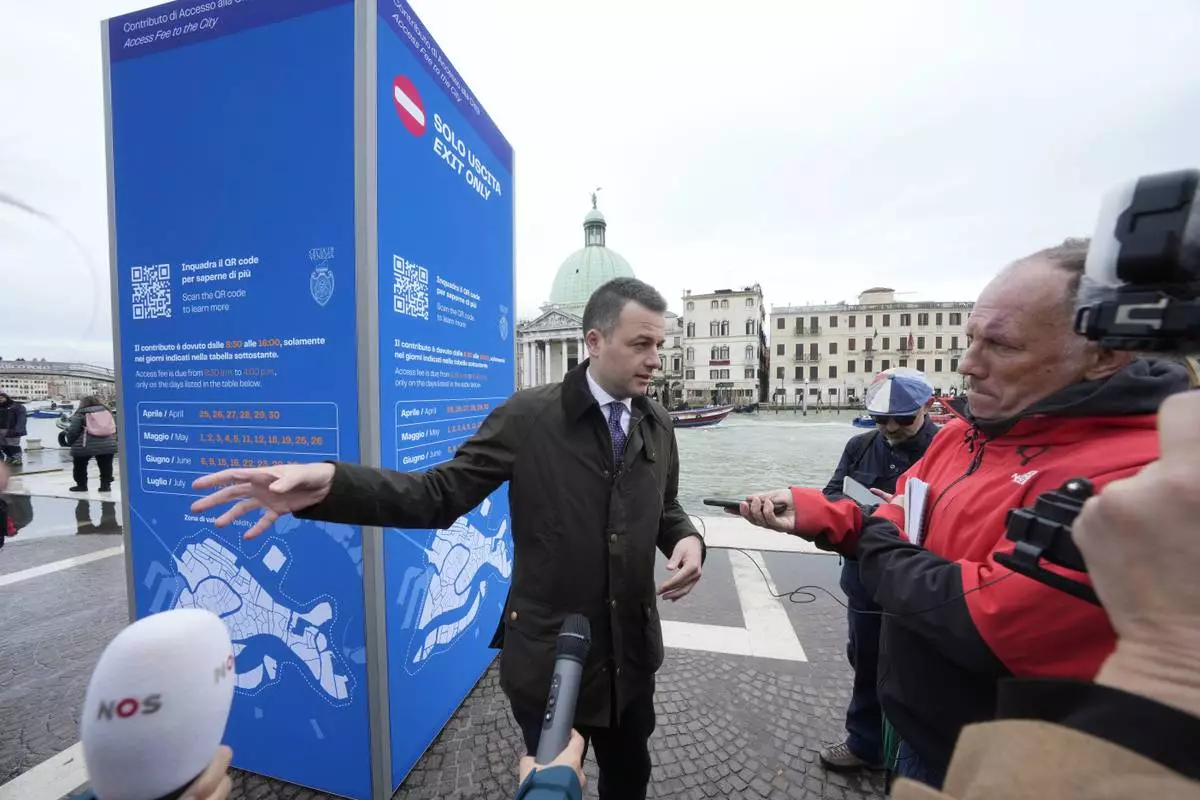
Venice councillor Simone Venturini speaks with reporters in front of a tourist tax totem in Venice, Italy, Wednesday, April 24, 2024. The lagoon city of Venice begins a pilot program Thursday, April 25, 2024 to charge daytrippers a 5 euro entry fee that authorities hope will discourage tourists from arriving on peak days. Officials expect some 10,000 people will pay the fee to access the city on the first day, downloading a QR code to prove their payment. (AP Photo/Luca Bruno)
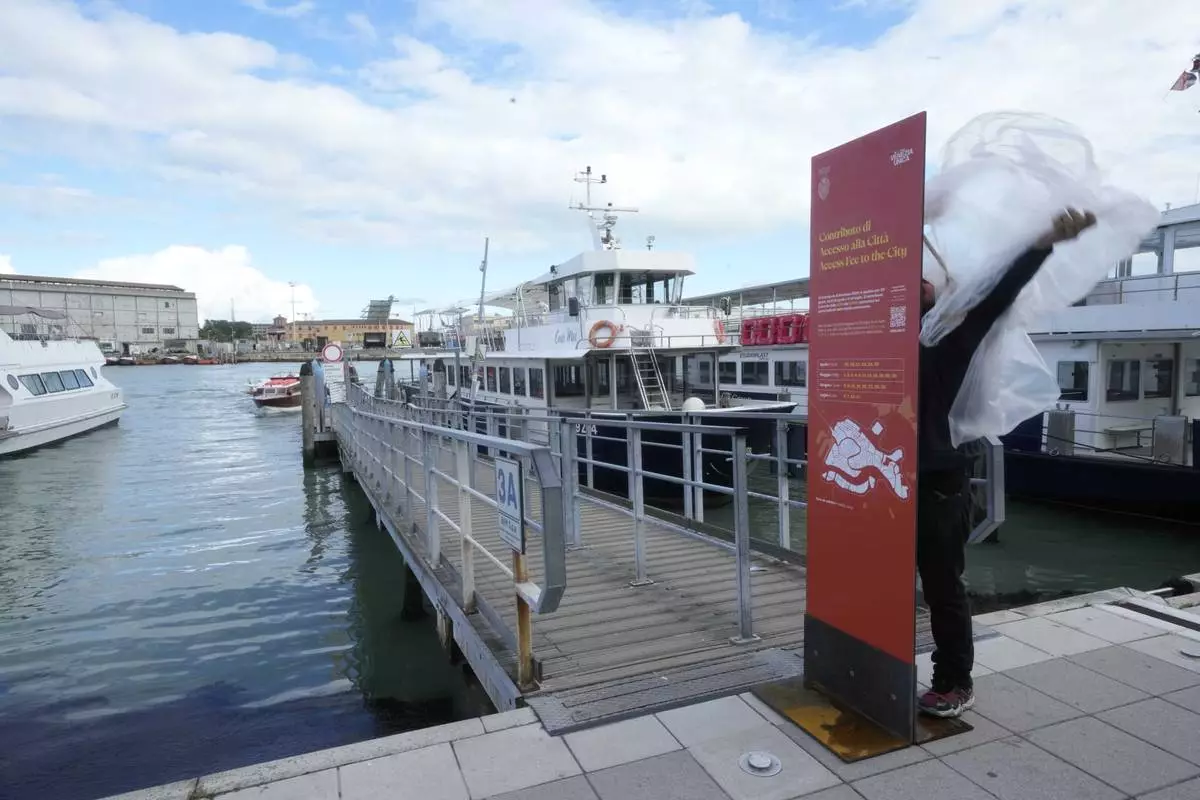
Workers prepare banner explaining how to pay the tourist tax in Venice, Italy, Wednesday, April 24, 2024. The lagoon city of Venice begins a pilot program Thursday, April 25, 2024 to charge daytrippers a 5 euro entry fee that authorities hope will discourage tourists from arriving on peak days. Officials expect some 10,000 people will pay the fee to access the city on the first day, downloading a QR code to prove their payment. (AP Photo/Luca Bruno)
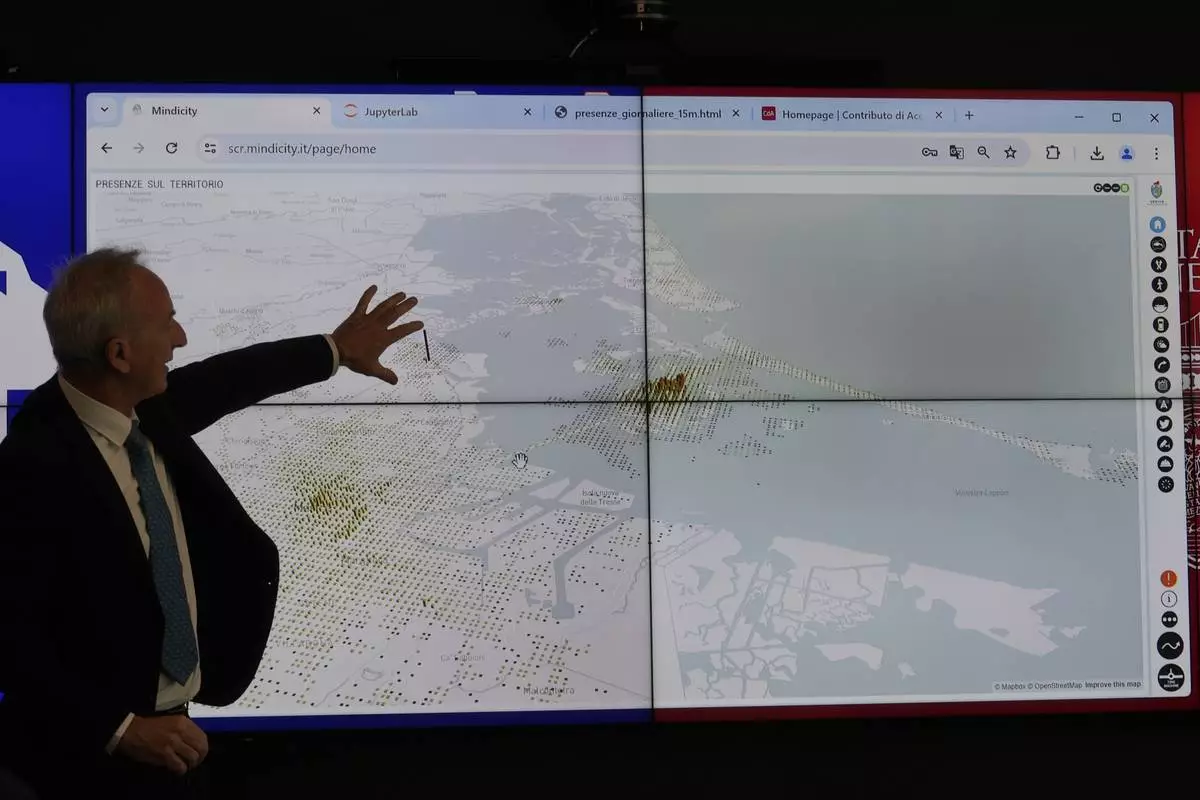
Marco Bettini, director of Venis Informatics System, gestures as he explains the Venice density to reporters at the police Venice control room in Venice, Italy, Wednesday, April 24, 2024. The lagoon city of Venice begins a pilot program Thursday, April 25, 2024 to charge daytrippers a 5 euro entry fee that authorities hope will discourage tourists from arriving on peak days. Officials expect some 10,000 people will pay the fee to access the city on the first day, downloading a QR code to prove their payment. (AP Photo/Luca Bruno)
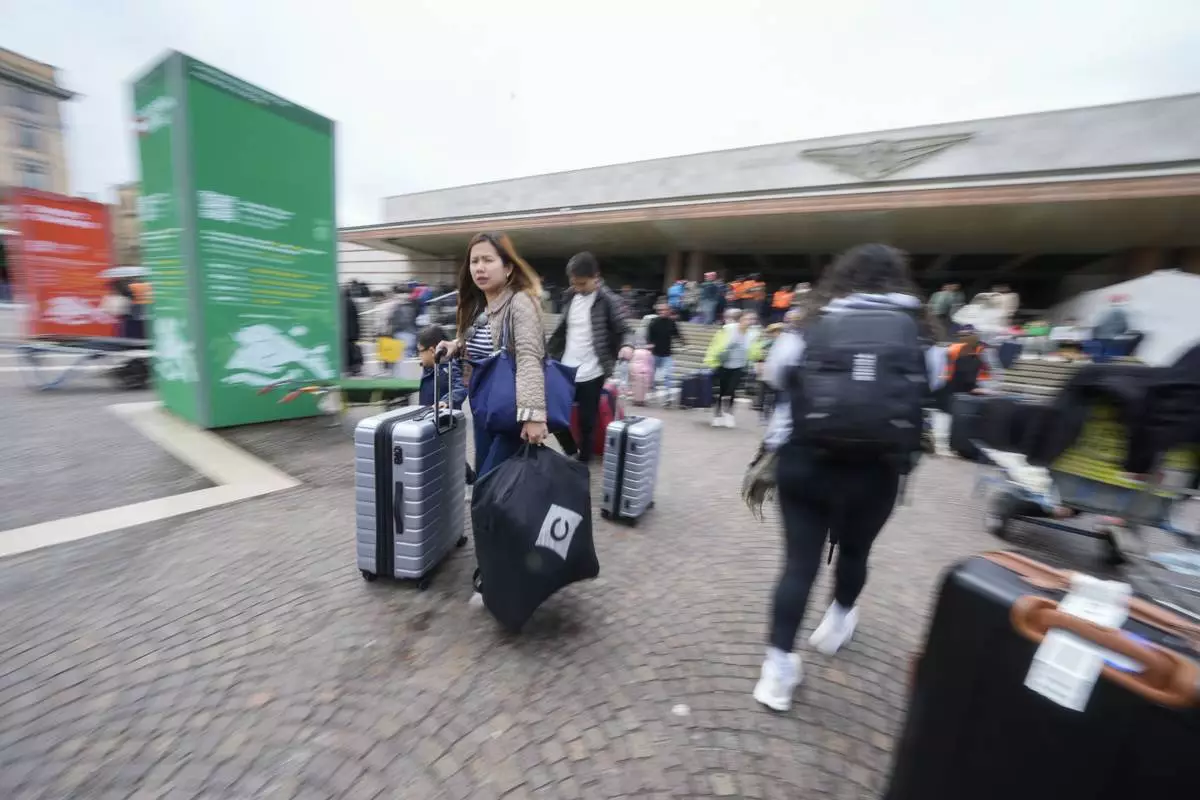
Tourists arrive at the main train station in Venice, Italy, Wednesday, April 24, 2024. The lagoon city of Venice begins a pilot program Thursday, April 25, 2024 to charge daytrippers a 5 euro entry fee that authorities hope will discourage tourists from arriving on peak days. Officials expect some 10,000 people will pay the fee to access the city on the first day, downloading a QR code to prove their payment. (AP Photo/Luca Bruno)
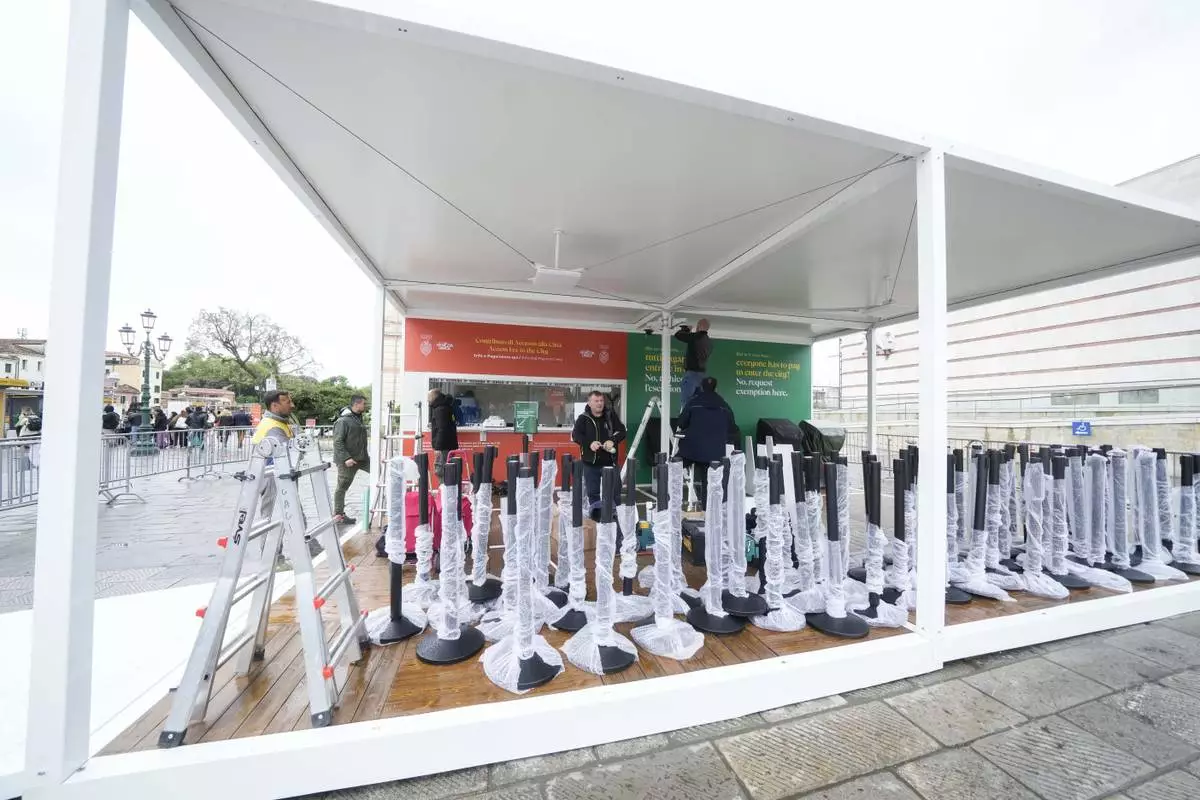
Workers prepare the tourist tax cashier desks outside the main train station in Venice, Italy, Wednesday, April 24, 2024. The lagoon city of Venice begins a pilot program Thursday, April 25, 2024 to charge daytrippers a 5 euro entry fee that authorities hope will discourage tourists from arriving on peak days. Officials expect some 10,000 people will pay the fee to access the city on the first day, downloading a QR code to prove their payment. (AP Photo/Luca Bruno)
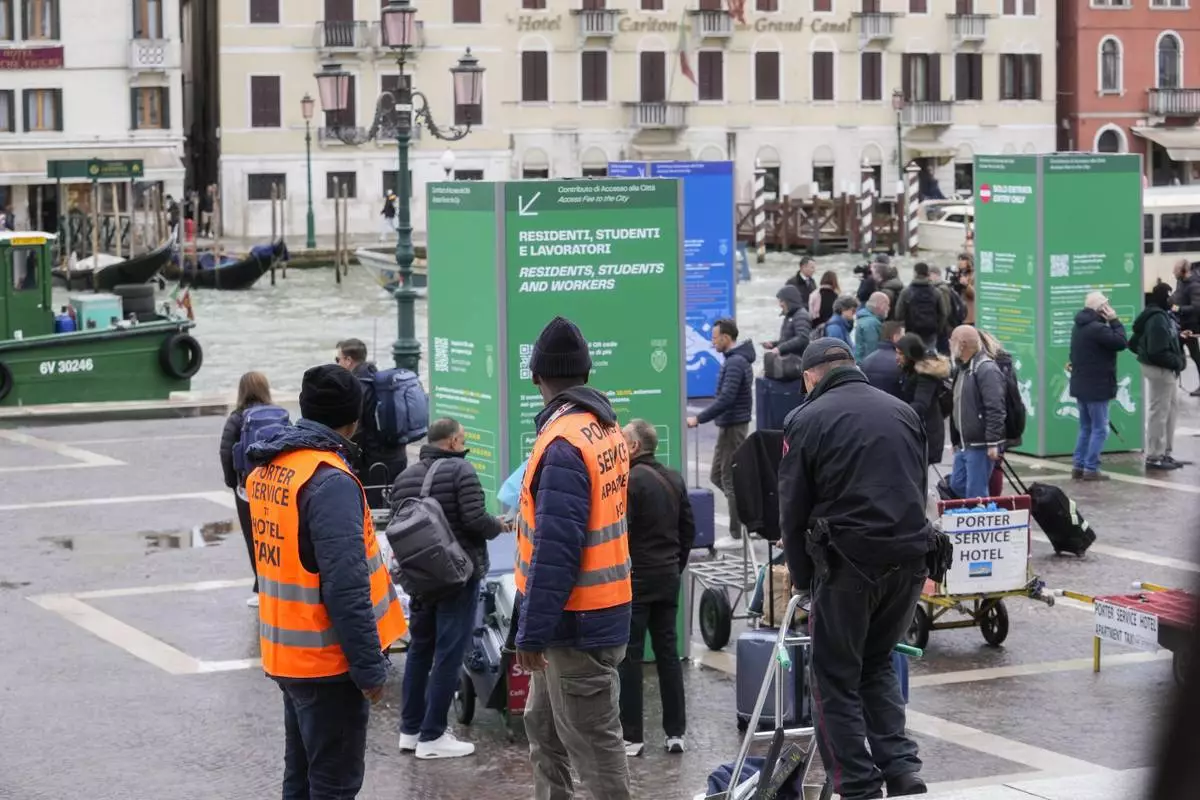
Porters wait for tourists outside the main train station in Venice, Italy, Wednesday, April 24, 2024. The lagoon city of Venice begins a pilot program Thursday, April 25, 2024 to charge daytrippers a 5 euro entry fee that authorities hope will discourage tourists from arriving on peak days. Officials expect some 10,000 people will pay the fee to access the city on the first day, downloading a QR code to prove their payment. (AP Photo/Luca Bruno)
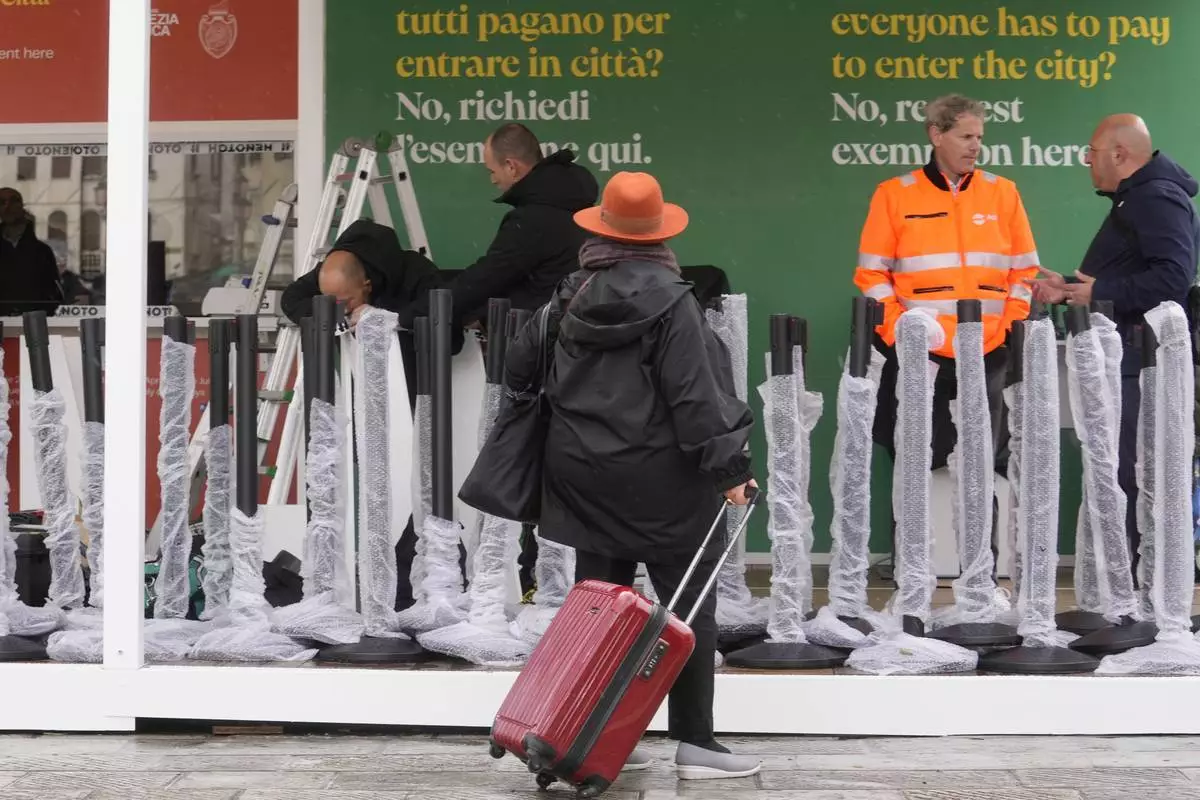
Workers prepare the tourist tax cashier desks outside the main train station in Venice, Italy, Wednesday, April 24, 2024. The lagoon city of Venice begins a pilot program Thursday, April 25, 2024 to charge daytrippers a 5 euro entry fee that authorities hope will discourage tourists from arriving on peak days. Officials expect some 10,000 people will pay the fee to access the city on the first day, downloading a QR code to prove their payment. (AP Photo/Luca Bruno)
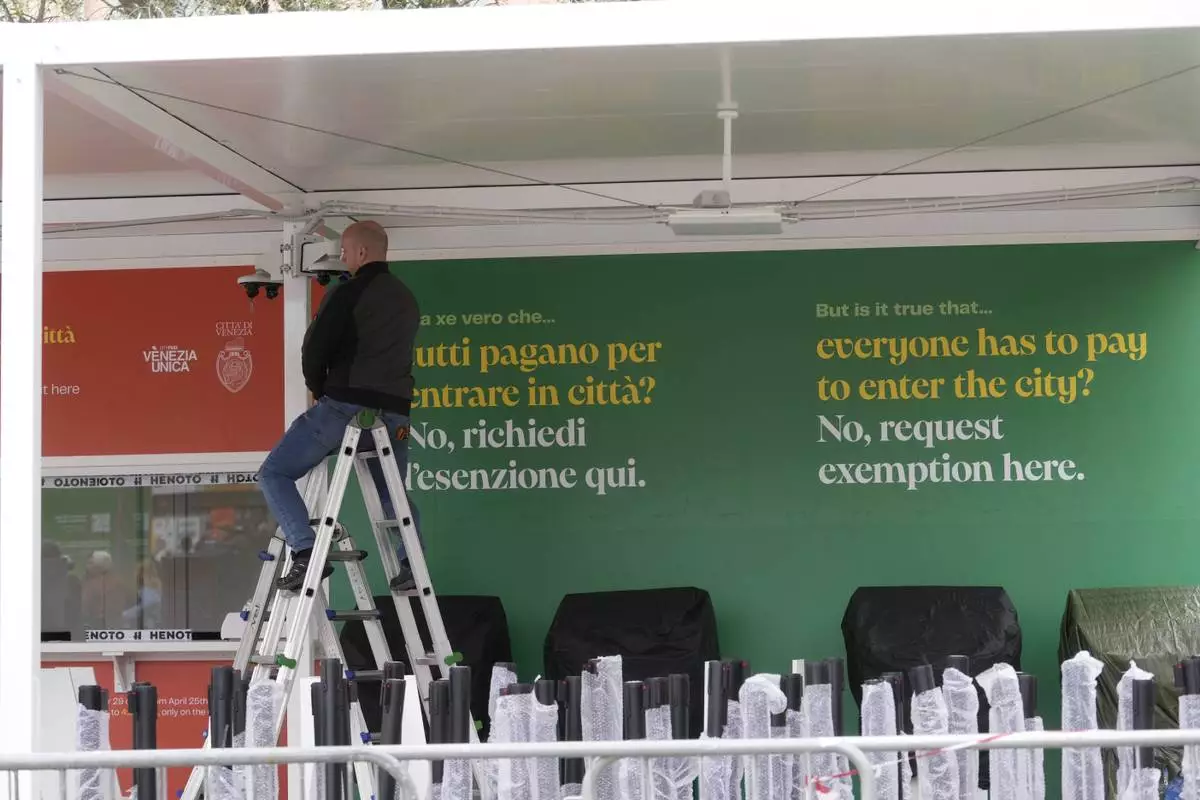
Workers prepare the tourist tax cashier desks outside the main train station in Venice, Italy, Wednesday, April 24, 2024. The lagoon city of Venice begins a pilot program Thursday, April 25, 2024 to charge daytrippers a 5 euro entry fee that authorities hope will discourage tourists from arriving on peak days. Officials expect some 10,000 people will pay the fee to access the city on the first day, downloading a QR code to prove their payment. (AP Photo/Luca Bruno)
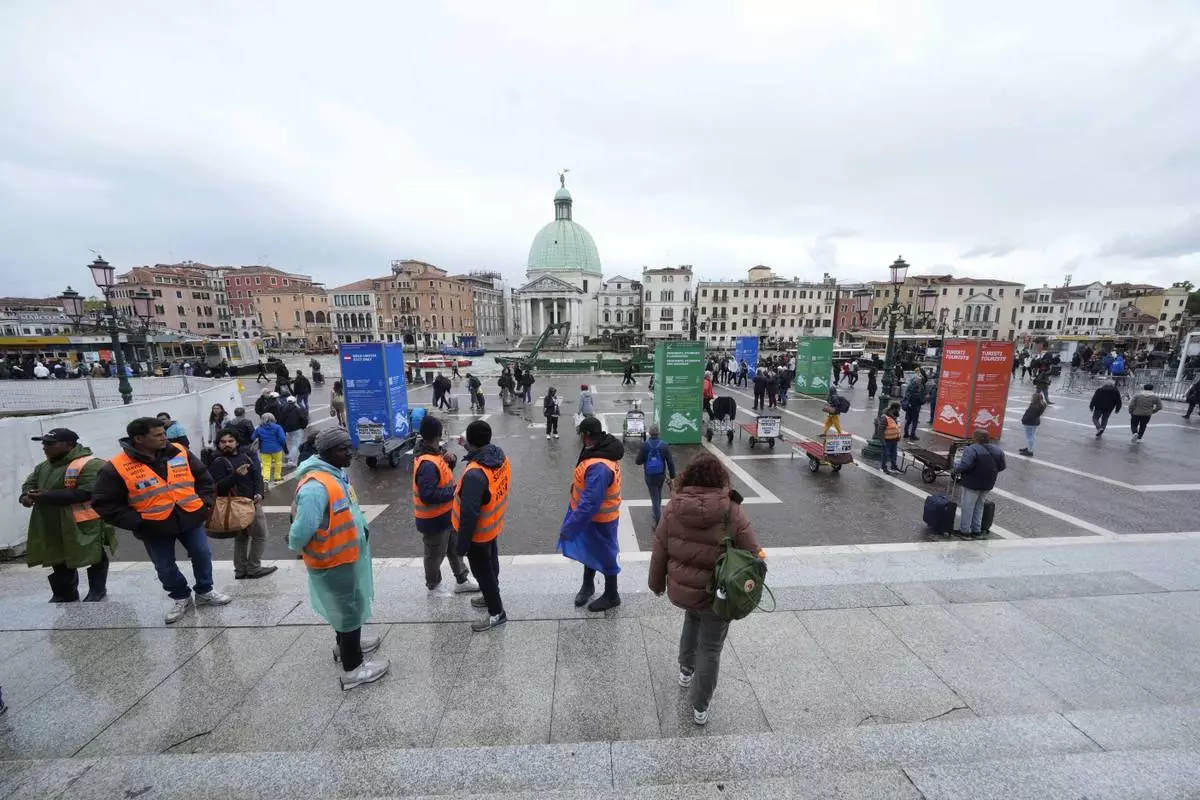
Porters wait for tourists outside the main train station in Venice, Italy, Wednesday, April 24, 2024. The lagoon city of Venice begins a pilot program Thursday, April 25, 2024 to charge daytrippers a 5 euro entry fee that authorities hope will discourage tourists from arriving on peak days. Officials expect some 10,000 people will pay the fee to access the city on the first day, downloading a QR code to prove their payment. (AP Photo/Luca Bruno)
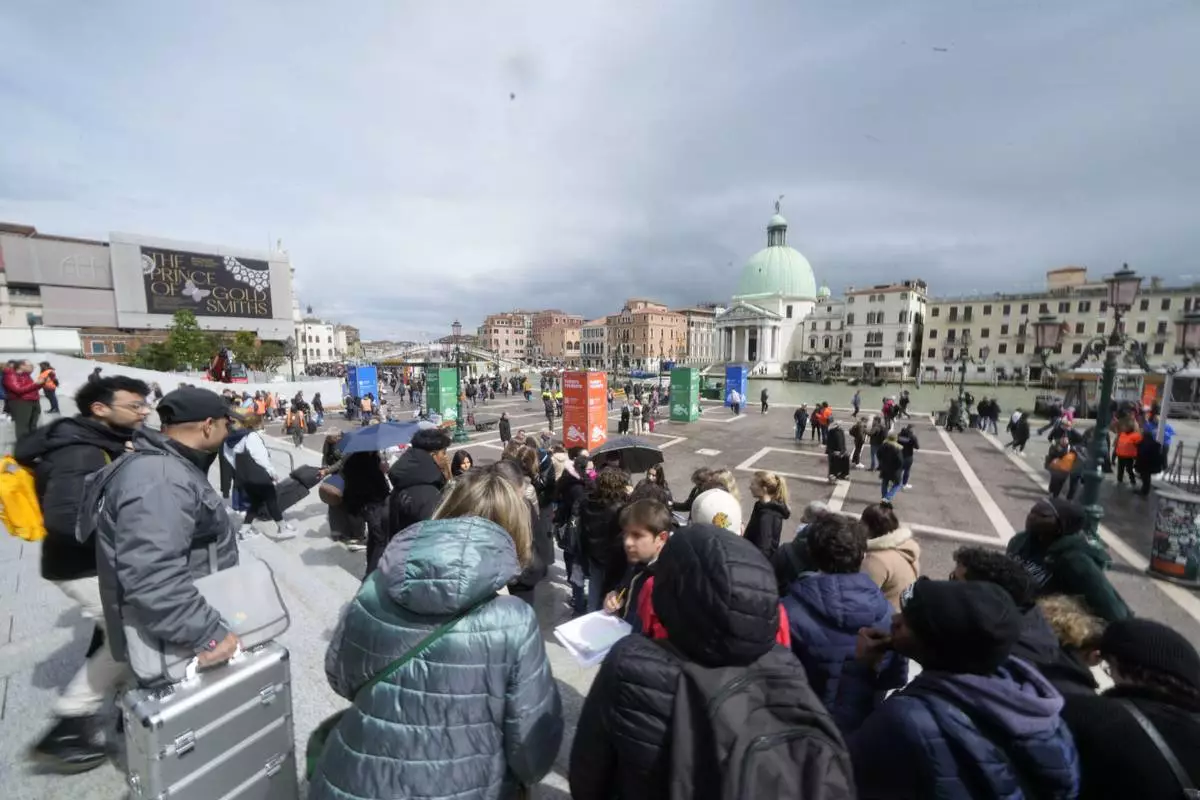
Tourists arrive outside the main train station in Venice, Italy, Wednesday, April 24, 2024. The lagoon city of Venice begins a pilot program Thursday, April 25, 2024 to charge daytrippers a 5 euro entry fee that authorities hope will discourage tourists from arriving on peak days. Officials expect some 10,000 people will pay the fee to access the city on the first day, downloading a QR code to prove their payment. (AP Photo/Luca Bruno)
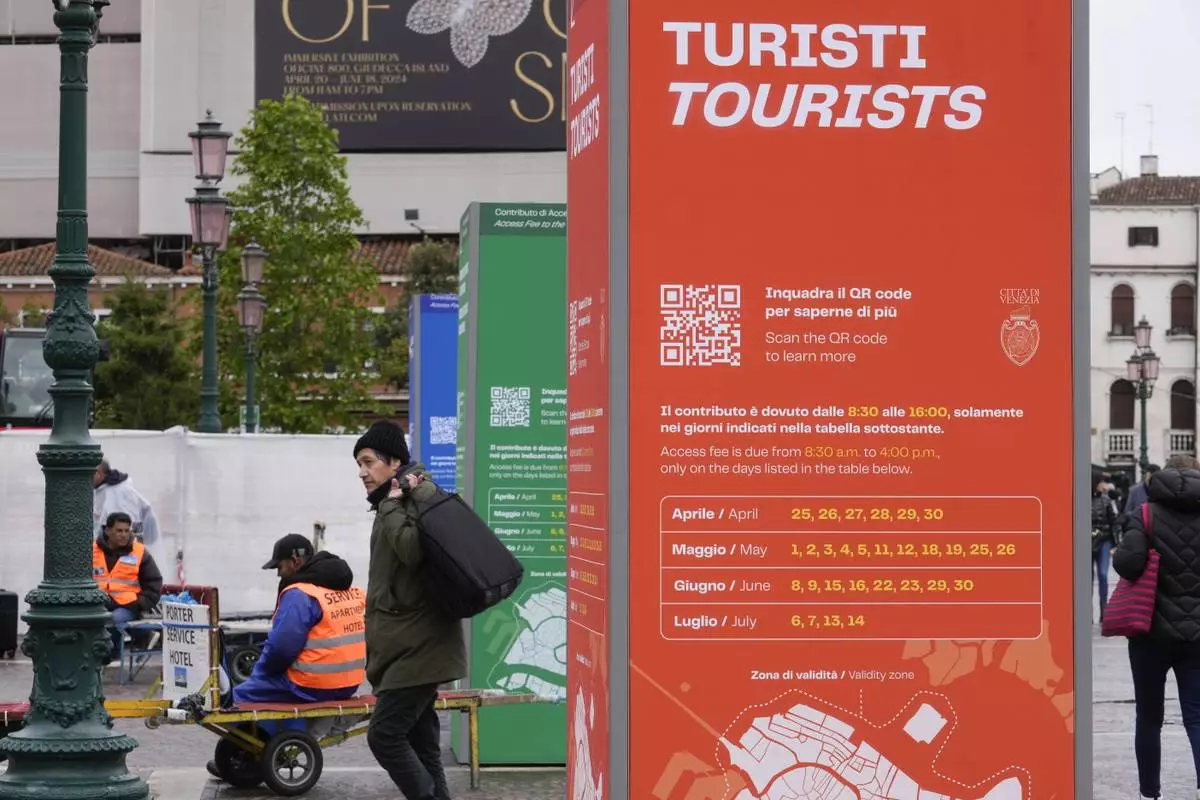
Tourist information boards are seen outside the main train station in Venice, Italy, Wednesday, April 24, 2024. The lagoon city of Venice begins a pilot program Thursday, April 25, 2024 to charge daytrippers a 5 euro entry fee that authorities hope will discourage tourists from arriving on peak days. Officials expect some 10,000 people will pay the fee to access the city on the first day, downloading a QR code to prove their payment. (AP Photo/Luca Bruno)
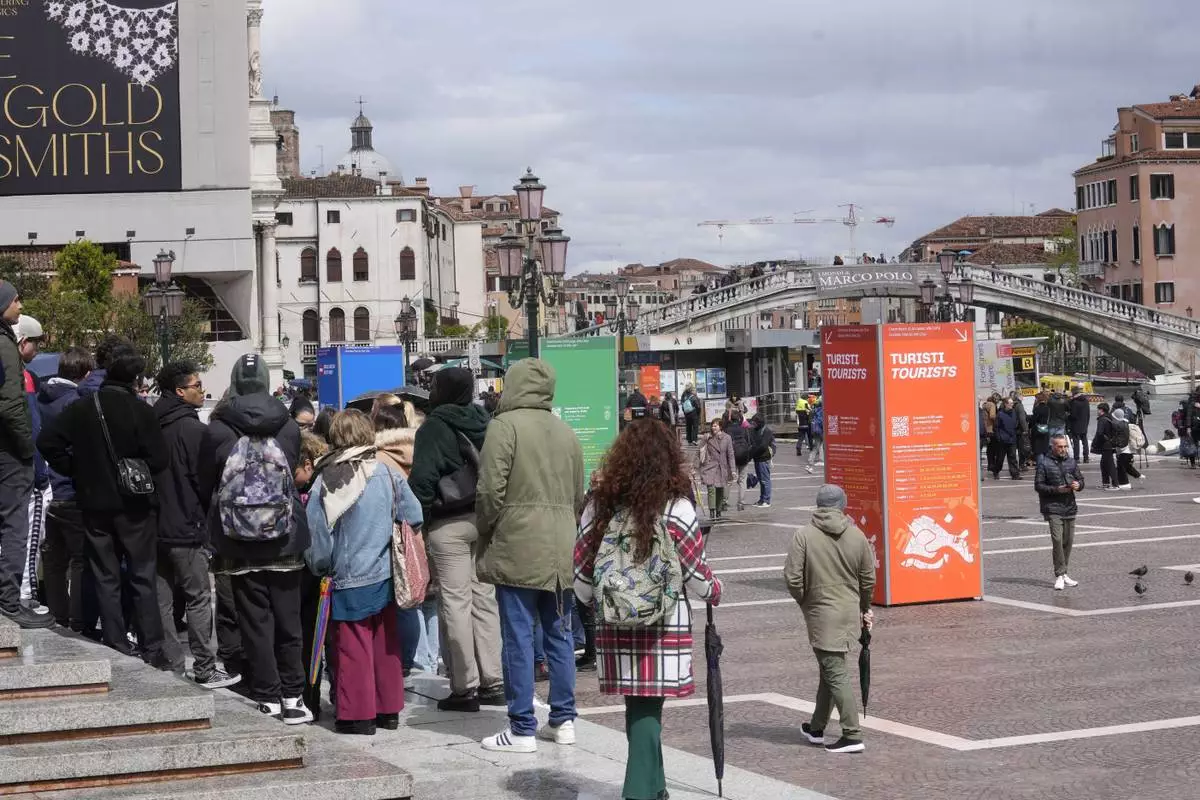
Tourists arrive outside the main train station in Venice, Italy, Wednesday, April 24, 2024. The lagoon city of Venice begins a pilot program Thursday, April 25, 2024 to charge daytrippers a 5 euro entry fee that authorities hope will discourage tourists from arriving on peak days. Officials expect some 10,000 people will pay the fee to access the city on the first day, downloading a QR code to prove their payment. (AP Photo/Luca Bruno)



























